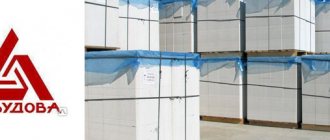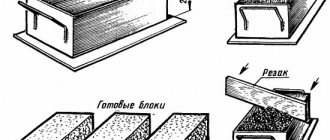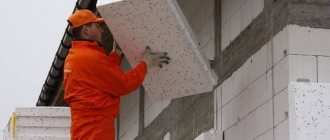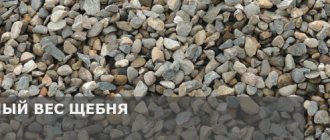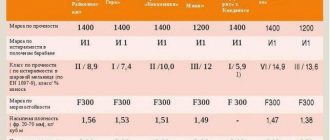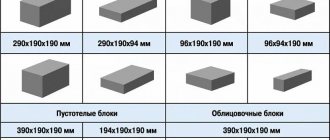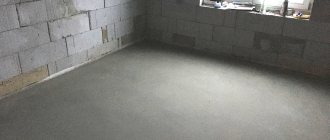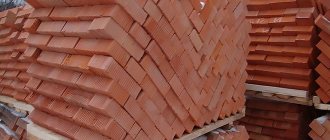Aerated concrete blocks from JSC Zabudova
Gas silicate blocks are considered one of the best materials for low-rise construction today. This type of cellular concrete has both sufficient strength and good thermal insulation characteristics. However, the quality of aerated concrete and strict adherence to technology at all stages are very important here: from preparing the mixture to steaming in an autoclave, where the blocks gain the necessary strength. This is why positive reviews of good brands work better than any advertising. The Belarusian Zabudov plant turned out to be one of such successful manufacturers, so we decided to make a brief review of its products.
Features and characteristics of aerated concrete
Zabudov OJSC gas silicate blocks are produced in six density options. In accordance with this indicator, they have certain characteristics:
1. D350 - the lightest thermal insulation materials also have a minimum strength of 15 kgf/cm2 (class B1). But their thermal conductivity does not exceed 0.09 W/m °C.
2. D400 - with the same compression resistance and frost resistance, F25 retains heat a little worse, transmitting 0.10 W/m °C. However, this is enough for the construction of partitions and internal contours.
3. D450 - such gas silicate blocks can withstand compression of 25 kgf/cm2 (B1.5) and have frost resistance within 25-35 cycles. Their heat transmitting capacity is not much higher than that of other light stones - only 0.11 W/m °C.
4. D500 - the so-called heat-insulating structural blocks are a transitional form from lightweight aerated concrete to a stronger one. However, they are only suitable for self-supporting walls, although their strength class corresponds to B1.5-2.5. With heat conservation, there is also a relative order here - 0.12 W/m °C.
5. D600 - from such material it is quite possible to build a box of a house with 1-2 floors. The strength of the blocks has increased noticeably (35-40 kgf/cm2), as has the thermal conductivity - 0.14 W/m·°C.
6. D700 - good structural gas silicate blocks that can withstand loads of up to 50 kgf/cm2 and 35-50 freeze-thaw cycles. But heat retention here is more likely to be a pleasant bonus: 0.18 W/m °C is not the best indicator, although it is quite comparable with some types of wood.
The Belarusian production uses imported equipment and technologies of gas silicate quality - the Hebel company. Now Zabudova is the only company in the Republic of Belarus that adds gypsum to the raw material, and molds the blocks not using the impact method, but using vibrating platforms.
Range
On the spoon side, all Zabudov’s products made of aerated concrete have the same dimensions - 625x250 mm (sometimes 599x250 are found). The sizes of the blocks can differ only in thickness, which allows you to select a suitable masonry scheme to obtain the required wall thickness with the required thermal insulation values.
- Wall blocks are presented in 7 standard sizes from 250 to 500 mm.
- There are the same number of partition walls, but their thickness already varies within the range of 50-200 mm.
In addition, Zabudova produces tongue-and-groove blocks (read about their advantages in the article Features of tongue-and-groove slabs and blocks) with the same set of sizes and a slightly shortened spoon 250x599 mm. To form reinforced lintels for door and window openings, U-shaped profiles and reinforced beams are made from autoclaved aerated concrete. They come with a density of D500-D600 and a thickness of 200 to 400 mm. Prices for such products are set individually, but if we convert them into cubic meters, we get a surprisingly low cost - in the range of 12-14 thousand rubles.
The main advantages of Belarusian products:
- The correct geometry (dimensional deviations do not exceed 1-2 mm), allowing you to quickly and tightly lay gas silicate blocks on glue with a joint thickness of only 1-3 mm.
- Good noise insulation values: 44-46 dB for single-layer masonry and 52-53 dB for double-layer masonry.
- Affordable price and decent selection, but not too bloated so that even an untrained builder can easily navigate.
Prices for Zabudov cellular concrete blocks in Moscow
| Type | Density grade | Dimensions, mm | Cost, rub | |
| a piece | for 1 m3 | |||
| Wall | D400 | 625x400x250 | 188 | 3000 |
| D500 | 625x300x250 | 145 | 3090 | |
| D600 | 625x375x250 | 187 | 3200 | |
| Septal | D300 | 600x375x250 | 200 | 3550 |
| D400 | 600x300x250 | 153 | 3400 | |
| D500 | 625x100x250 | 49 | 3130 | |
Despite the remoteness of the main production facilities of Zabudov, Russians also have the opportunity to buy blocks with delivery to the site. The holding has its own ATP and a fairly wide dealer network in the Russian Federation. Its official representative offices are located in Moscow, St. Petersburg and Smolensk.
“Zabudova” helps us build and live
Background The activities of OJSC “Zabudova” are inseparably connected with the village of Chist, Molodechno district. The historical name of the village comes from the medicinal plant guillemot, which grows in swampy areas. In the early fifties, powerful equipment came to the swamps and drainage work began. In 1956, a workers' settlement began to be built on the driest place. In 1955, the Chist peat enterprise was created, which in 1964 was transformed into the Krasnoye plant. In 1982, the Krasnoe experimental mechanical plant was organized, and hot and cold stamping shops began operating. 1984 - construction of a large-panel house-building plant began. In November 1988, the Krasnenskoye Design and Construction Association was created, which a year later was renamed the Chistinsk Housing Construction Association. In 1990, the newest history of Chisti began - the joint-stock company “Zabudova” was formed. This event will also have an impact on the development of the construction industry in Belarus.
General Director of Zabudova OJSC Mikhail Vasilenko: “The main thing for me in my work is that people believe me. I know that an enterprise is only doomed to success when people follow the leader. At the same time, you need to be honest with them, be able to set a task and take responsibility. Well, the process of an enterprise’s operation in the 21st century should be built on the principle: science comes first, then economics, then production, and lastly, administrative resources, which are the engine of the whole process.”
German-Belarusian symbiosis
In 1990, the history of the Soviet Union and the Warsaw bloc ended. The withdrawal of Soviet troops from Germany began. To alleviate the acute problem of housing for military personnel, it was decided to build several modern house-building plants in Russia, Ukraine and Belarus. A corresponding agreement was concluded between the USSR and Germany. Along with the construction of residential towns, it was planned to build construction industry factories, including in the village of Chist. Belarusians, on the basis of an existing rural house-building plant, in a short time needed to develop a modern concept, carry out design, construction, installation and commissioning work, and put the facility into commercial operation. German technologies were taken as a basis; workers and engineers were trained in Germany. The work began in 1992 and was successfully completed in 1999.
In the company store there is a choice of goods for every construction taste, notes the director of the Zabudov Company Store branch, Lyubov Papruga.
A complex approach
Today, any person coming to an enterprise will buy everything they need to build a house. But what materials can you build a house from? “Only from high-quality and environmentally friendly materials,” says Sergei Belanovich, chief engineer of Zabudova OJSC. The building structures plant produces almost a complete set of building materials for a house made of cellular concrete using technology from the German company Hebel. Including small wall blocks, reinforced wall panels, covering and floor slabs, beam-bearing lintels, tray blocks for load-bearing lintels, arched lintels, stair steps. According to the project, the annual productivity of the plant was 200 thousand m3, however, through modernization and reconstruction using domestic and world experience, the productivity of the cellular concrete workshop was achieved at 364.8 thousand m3 per year of products and structures made from cellular concrete. More than 30 recipes have been introduced into production, allowing the production of cellular concrete products and structures of various volumetric weights and strengths. Along with small blocks, the production of large-sized unreinforced wall blocks has been organized. By the way, cellular concrete combines advantages that can only be achieved by combining different materials. Thanks to its porous structure, it is both massive and light. On the one hand, it is durable and fireproof, like stone, on the other hand, it has the lightness and workability characteristic of wood. Products made from cellular concrete have exceptional thermal insulation properties, prevent significant heat loss in winter and avoid excessively high temperatures in summer, eliminate sudden temperature fluctuations and allow you to regulate indoor air humidity, helping to create a favorable microclimate. It is especially valuable that cellular concrete products are suitable for the construction of not only external and internal walls, but also roofs and ceilings, which leads to a reduction in heat losses of the entire building. During the operation of a building made of cellular concrete, heating costs are reduced by approximately 25-30 percent. The building structures plant of JSC Zabudova also produces heavy concrete products in a wide range (hollow-core floor slabs, concrete blocks for basement walls, strip foundation slabs, lintels (slab and block), heating main trays, foundations, fencing elements, fencing, well rings , floor slabs for rings, bottom slabs).
The head of the production department of Zabudova OJSC, Dmitry Novoselov, is proud of the products manufactured at the enterprise
The problem of home carpentry is easily solved by a woodworking plant. Wooden window and door blocks are made here. The plant also produces profiled wood parts (floor boards, cladding, platbands, plinths, handrails, window sill boards), piece parquet-P1 and laminated veneer lumber. For the manufacture of products, equipment from leading German companies Weinig, Hess, Dimter, paint and varnish equipment and drying chambers from Eisenmann are used. They produce modern wooden windows of any size, architectural design and complex structures, with double (glazed) or triple (double-glazed) glazing, with one or two degrees of freedom, single-leaf, double-leaf, tri-leaf and fixed, with a tilt-and-turn opening mechanism and mode infiltration. The technological equipment of DOZ OJSC “Zabudova” allows us to produce wooden doors of frame and panel construction, using high-quality fittings, both glazed and solid. Door panels are made of solid wood with an original profile pattern. The surface of joinery products is painted with environmentally friendly water-soluble varnishes and primers based on acrylic emulsions. The construction materials plant of JSC Zabudova, using technology and equipment from the Finnish company Partek Concrete Engineering Ltd, produces dry building mixtures (more than 200 recipes), with which you can finish the house. In terms of their quality and technical and economic indicators, building mixtures correspond to world standards. Compared to mortars prepared directly at the construction site, or with factory-made mortars, modified dry mixes significantly improve the quality and level of construction work due to the stability of the compositions and effective mixing. The main distinguishing feature of dry mortar mixtures produced at the Zabudova OJSC building materials plant is the inclusion of own-produced hydrosilicate filler in the composition of the mixtures as a partial replacement for sand. Lime is produced here using the technology of the German company HUMBOLDT WEDAG ZAB GMBH. A streamlined technological process, reliable equipment, and a high production culture allow us to obtain high-quality products. It should be noted that the company was the first in the Republic of Belarus and the CIS to master the production of hydrated lime without additives. The building materials plant also organizes the production of high-strength gypsum. The roof from “Zabudova” is simply a sight for sore eyes and will last a century. The plant produces cement-sand tiles using equipment and technology from SCHADE and Claudius Peters (Germany). Here, complete sets of cement-sand tiles for roofing are manufactured: groove (main), pediment, ridge, half and special (passage, foot, snow-retaining, ventilation). Roof tiles from “Zabudova” are distinguished by durability (guaranteed service life of 30 years), efficiency, ideal protection from climatic influences, good sound insulation, rich colors, wide range, ease of installation and operation, and environmental friendliness. “Zabudova” will help decorate the surrounding area. The production of landscaping elements and small architectural products is organized using the equipment of one of the leading German companies Masa-Henke. These are paving slabs “brick”, “coil”, “paving stones”, “square”, L-shaped, tiles for parking lots, side stones for sidewalks with straight and rounded profiles, side road tiles, etc. The color range of paving slabs is so diverse that it allows even the most demanding and scrupulous customer to choose what he likes. In addition, the production of original flower beds has been mastered, as well as unique box-section tiles, which involve laying vegetable soil in the voids of the tiles for grass to grow among the paving elements.
Victor Pashin and Ilya Kutsenko assemble beautiful windows
Well, Zabudova-Stroykompleks, which develops design documentation for the construction of buildings and structures, will help you design the house. By the way, “Zabudova” is an active participant in all programs for the construction and improvement of cities and towns of the Republic of Belarus. One of the main ones is the State program for organizing the construction of economical estate housing in the regions and the city of Minsk. On behalf of the President of Belarus, in the areas of Bolshaya Slepyanka and Gazeta Izvestia Avenue, an experimental construction of low-rise residential buildings was carried out using structures and materials produced at the factories of the house-building plant OJSC Zabudova. The result was the creation, based on the use of the products of the house-building plant Zabudova OJSC, of a new construction system, which, thanks to its versatility and flexibility, opens up wide opportunities for architects, designers and builders. The experience of building and operating houses from materials and structures produced by DSK-Chist has convincingly proven that in our republic there is a real opportunity to build rational, high consumer and operational quality residential buildings from local environmentally friendly building materials that meet world standards. The capacity of DSK-Chist allows us to annually produce a full set of products for the construction of more than 1000 individual residential buildings. Residential, public and social buildings are built from the products of the house-building plant in Minsk and in other regions of the Republic of Belarus, in the CIS and Baltic countries. You can deliver building materials to their intended destination with the help of Zabudova-Avtotrans, which transports finished products to customers and subsidiaries, and also provides the plants of Zabudova OJSC with raw materials (sand, cement, lime, gypsum, wood, etc. .). Currently, Zabudova OJSC includes 25 divisions of construction, trade, industrial, agricultural and other areas, which provide employment to 2.5 thousand people. Until 2006, each of them was a legal entity, had an independent balance sheet, seal, stamps, settlement and other accounts in banking institutions. In November 2006, the company underwent a reorganization. Today OJSC “Zabudova” is a gigantic modern industrial and economic complex, the scope of which includes not only the production and sale of the main range of modern materials and structures that allow the construction of turnkey residential buildings with a high level of comfort. The company has enormous production, construction and design potential. It designs and builds cultural, social and industrial facilities, and is capable of carrying out full-scale low-rise development in rural areas and cities.
Shift foreman Gennady Seregov and cutting complex operator Yaroslav Ivashinko are all at work
Belarusian way
In Russia and Ukraine, enterprises that were created simultaneously with Zabudova failed long ago. In Belarus, JSC Zabudova has become a powerful entity in the construction industry, whose products are in high demand not only in the republic, but abroad. One of the fundamental reasons for this is the Belarusian economic path laid by the head of our state. Thanks to him, plants and factories are successfully operating in the republic, fields are being sown and decent harvests are being harvested. Today the small republic is known for its industrial strength throughout the world. When the food crisis rages in the world, Belarus actively exports food products. Another reason that “Zabudova” is afloat is the concern of people, including managers, who care about their enterprise.
General
When paratrooper Mikhail Vasilenko jumped with a parachute for the first time, he didn’t even have time to get scared. But with the second jump came fear. “But after it I forgot about the feeling of fear,” admits the general director of Zabudova OJSC, Mikhail Vasilenko. And it seems like forever. It was Vasilenko who built the first Belarusian cement plant in the early 90s. He devoted himself so much to his work that he developed an occupational disease. Vasilenko is responsible for the early construction of a thermal power plant in Kaliningrad (where the Belarusian builders of Belenergostroy OJSC confirmed their high class) and other significant cases. As if for a breakthrough, he was thrown into “Zabudova”, where debts were mounting (and this despite the fact that the products were popular). Of course, we had to carry out reforms that not everyone liked. For example, if previously there were six factories with their own accounts, now there are four production facilities. Representative offices operating outside the republic, which were operating at losses, were liquidated. Now dealers handle sales. As a result, Zabudova operates with a net profit, which last year reached almost 13 billion rubles. Vasilenko’s merit lies in the fact that he was able to create an atmosphere of honesty in everything at the enterprise. Rumors that arise are brought up for general discussion. And if you add here a salary exceeding a million, it becomes clear why the queue of people wanting to work here is 200 people. And this despite the fact that recently the number of employees has increased by 200 people due to the expansion of production. The CEO is concerned about the quality of not only work, but also rest. A football team, amateur performance groups, a recreation center where you can go fishing for fun have been created, and a tourist rally was recently held. And the general director’s immediate plans include the construction of a Palace of Culture in Chisti.
Tomorrow's Belarus
The living conditions for workers in “Zabudovo” were simply excellent. The abundance of beautiful houses in Chisti creates an atmosphere of peace. And if you consider that beautiful nature harmoniously coexists with the benefits of civilization (for example, a wonderful supermarket), then you begin to really envy the residents of Chisti. What well-groomed areas, what beautiful gardens, fabulous playgrounds appeared before my eyes! Living in such a place is simply a joy. All this together caused the Chistinsky baby boom. Here, last year, the highest birth rate in the Minsk region was recorded. It seems that a prototype of the Belarusian future is emerging in Chisti. Ultra-modern, powerful, environmentally friendly, thriving production, decent salaries, aesthetic living conditions with all amenities. Who would refuse to live in such a place! As I was leaving Chisti, a church built with the help of OJSC “Zabudova” appeared in the distance. Multi-colored, golden and fabulous, she was so beautiful, as if she had descended from heaven.
Useful address:
222321, Belarus, Minsk region, Molodechno district, Chist village, st. Zavodskaya, 1, tel. (01773) 99 387, fax (01773) 90 314.
Advantages of gas silicate blocks in construction
The main area of use of gas silicate blocks is insulation of building structures and thermal insulation of equipment (if the temperature of the insulating surface is less than +400 °C). The advantage of Belarusian products is as follows.
- Reliability. Gas silicate blocks are an ageless material with the strength of stone.
- Heat. The high thermal resistance of the material allows you to reduce heating system costs by up to 20–30%.
- Installation speed. The lightness, low density of gas silicate and large block sizes increase the speed of laying and reduce the consumption of the building mixture.
- Beauty. The ability to easily process the material allows you to create various shapes of arches, pyramids, corners, which gives buildings architectural expressiveness.
- Fire safety. Gas silicate blocks correspond to class I fire resistance and protect against the spread of fire.
- Economical. The geometric accuracy of gas silicate blocks allows them to be placed “on glue”, while avoiding “cold bridges” and significantly reducing the thickness of the plaster.
- Ease of transportation. Due to the low weight-to-volume ratio of the block, the materials can be easily transported to the construction site by rail or road transport.
Workers of OJSC "Zabudova": how long can you tolerate the employer's lawlessness?
Our editorial office received a letter from indignant employees of OJSC “Management”. Their indignation is caused by the violation of the terms of payment of wages stipulated by employment contracts, the lack of salary growth for almost a year, as well as the method of issuing it - wages to the workers of Zabudova OJSC are given for several days or even weeks in small payments.
Below is the text of the letter received by the Belarusian News Service:
«The workers of OJSC “Management of the village of Chist”, Molodechno district, are bothering you. For many months (from November 2013 to the present), we were not paid our salaries on time. According to our employment contracts, salaries must be paid to us on the 25th of each month. However, on this day we are either “given a handout” in the form of some meager amount (500,000-1 million), or not given any money at all. The employer pays the rest of the salary in some strange small payments over several days, or even weeks. Appealing to the employer for clarification does not bring results (the director simply does not contact the workers). Our trade union cannot do anything, because, according to the chairman of the trade union committee L. I. Mikulich, the director simply does not listen to her. Maybe you can somehow influence our employer, General Director of OJSC “Managing Oleg Petrovich Gaidukevich.
And one more small point. According to Belstat, the nominal accrued average monthly wage of workers of the Republic of Belarus in June 2014 increased compared to May 2014 by 2.4%, or by 142.6 thousand rubles. However, at our enterprise, workers’ wages have not been raised for more than a year. In dollar terms, workers have already lost from 70 to 100 USD in wages compared to the same period last year. When we verbally approached the employer with a request for a salary increase, we received the answer that “we should already have enough to live on.” At the same time, the company tightened the so-called "system of fines". They are deprived of additional payments and bonuses even for being late for work due to a deviation from the schedule of the bus that transports workers to factories. The bus is rented by OJSC "Manager of the Molodechno car park." Workers’ explanations about the reasons for being late for work for the above reasons are not taken into account
", - says the appeal of the working team of OJSC "Management".
Well, let’s hope that widespread coverage of this problem in the media will force the company’s management to reconsider the approaches to paying wages to the workers of the plant, which, as reported on the official website of the plant, “has been one of the largest enterprises in the construction industry in the Republic of Belarus for 20 years.”
General Director of OJSC "Managing
Gaidukevich Oleg Petrovich
Author: Belnovosti

